10 Best POS System for Small Business in 2026 | Top Picks
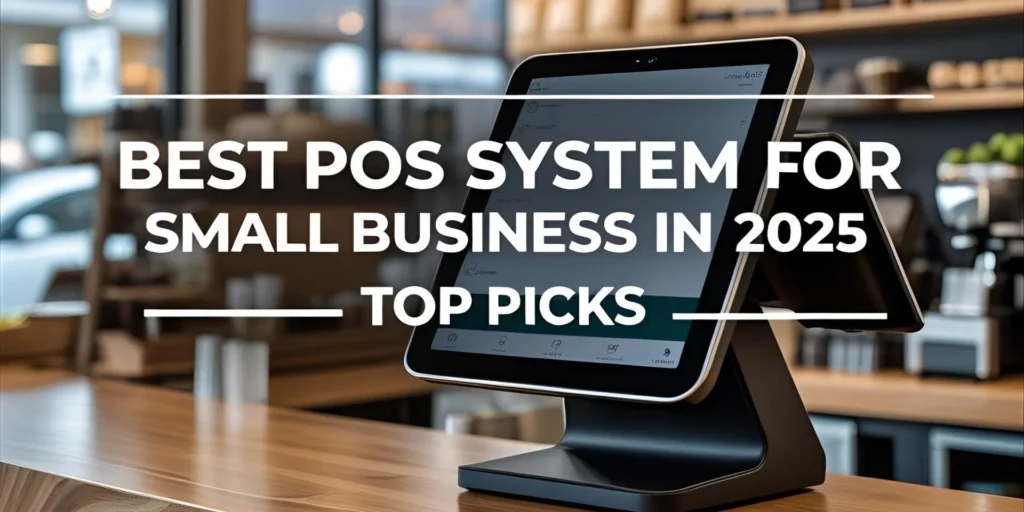
Contemporary retail businesses require efficient and precise solutions for smooth customer service. A powerful Point of Sale (POS) system is key to managing transactions, inventory, and gaining actionable insights. Choosing the right POS system helps small businesses streamline operations, reduce costs, and stay competitive in today’s digital environment. The right POS system can transform business efficiency and improve the bottom line.
In this blog we will rxplore the 10 best POS System for Small Business in India. Let’s dive in!
What is a POS System?
Point of Sale, or POS, system is a complex business administration system that uses and completes a transaction on the customer, and at the same time will take on other business operations. Unlike cash registers, the best pos system for small business presents a combination of hardware and software features which serve to form a central business management point.
Such advanced platforms handle payment processing, inventory management solutions, sales reporting and customer relationship management and employee scheduling on the same platform. In the process of seeking the best pos system for small business, the entrepreneur or business person learns that the systems act as the central nervous system of his or her operation.
Types of POS Systems
Traditional On-Premise POS Systems
Old fashioned on-premise systems utilize programmed software and fixed hardware systems that are placed locally. All the transactional data, along with business information, is stored in such solutions in the business premises on local servers or computers. Although they provide total control of data security and customization of the system, they do consume substantial initial investment on hardware, software and licenses, as well as, maintenance costs.
These systems are very reliable and do not require internet connectivity to be used successfully, which is why small businesses whose activities are stable and have certain specifications to security services tend to be drawn to use them.
Cloud-Based POS Systems
Cloud-based solutions are the new generation of point-of-sale expansion that saves data at a distance on the carefully guarded servers connected to the internet. These systems are very flexible in the sense that they enable the business owners to have access to crucial information in real-time across different locations using a wide variety of devices.
Cloud based systems are very useful to growing businesses due to their automatic updates, lower maintenance fees, and pricing structures. They support ecommerce platforms and third party applications with ease of integration and have strong backup and disaster recovery functions.
Mobile POS Systems
Mobile POS turns smartphones and tablets into high-end transaction processing devices, and it is ideal when the business needs to take payments on the move. They are ideal in pop-up shops, farmers markets, food trucks and other service based businesses where more traditional stationary systems would not work well.
The mobile pos system for small business can serve as inexpensive ways to enter into the business of new entrants into the business and at the same time deliver the fundamentals they require such as inventory management, capturing customer data and basic reporting capabilities using simple mobile applications.
Self-Service Kiosk Systems
Self-service Kiosks enable customers to order, pay and customize purchases on their own without human intervention thereby saving labour costs as well as making orders more precise. These systems also perform very well in fast food restaurants, stores, and recreation facilities where speed and efficiency are the main factors to customer satisfaction. Contemporary kiosk systems are designed to create a seamless connection with the known POS structure and, at the same time have the capability of providing upselling options and shorten the delays that might turn up during the business peak hours.
Why Your Small Business Needs a POS System
- Efficiency: A smoother process of transactions minimizes the wait time of the customers, minimizes mistakes in calculation, automates mundane operations, freeing personnel to provide customer service and making money.
- Accuracy: Automated pricing, calculations and tracking of stock levels is a big plus in terms of the elimination of human error in pricing, calculating taxes and managing inventory keeping profitability consistent and eliminating financial anomalies that plague a manual system.
- Insights: That is, with end-to-end reporting and analytics, purchase trends of its customers, peak sales times, product sales, and working trends can be observed to make data-driven decisions to streamline inventory levels, employee scheduling, and direct marketing efforts.
- Integration: New POSs automate the connection between accounting packages, e-commerce solutions, commercial tools and third-party applications, building a single business environment and leveling data silos and triple duplicate activities.
- Scalability: With cloud based solutions, as your company grows, you add new locations, process more transactions and feature more products without a total systems redesign or large hardware upgrades.
Key Features to Look for in a POS System
- Processing: payment processing that is dependable and facilitates various payment options, such as credit cards, debit cards, mobile payments, contactless-payments, and other upcoming payment technologies, makes customers more comfortable and, what results in fewer lost transactions.
- Inventory: Real-time inventory control including automatic stock alerts, purchase order automation, supplier management, multilocation monitoring to ensure product is never out of stock, carrying cost is minimized and across all sales channels maximum product availability is guaranteed.
- Reporting: Detailed analytics and built-in custom reports give visibility into sales data, customer activities, employee performance, and financial analysis and allows strategic planning and performance improvements across all business segments.
- Integration: Flawless interconnection with accounting software, e-commerce applications, marketing automation tools and applications utilized in the industry build a united business ecosystem, providing a lack of manual data entries and simplicity of operation.
- Support: Rapid resolution of any technical hurdles when it comes to offering reliable customer care facilities accessible on several fronts such as by phone, email, chat, and knowledge base content, help in reducing disruptions to business in the peak operating hours.
10 Best POS Systems for Small Businesses in 2025
1. Square POS
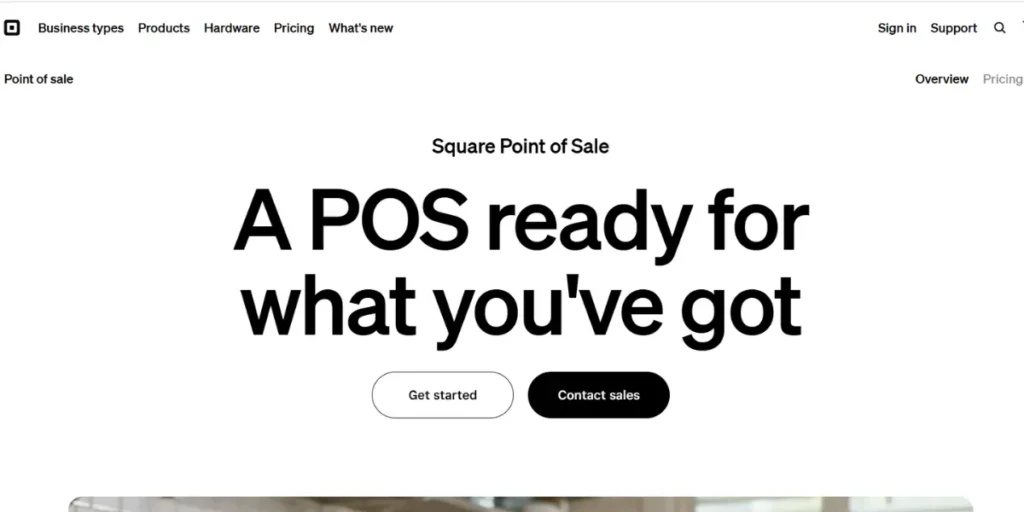
Square has proven to be one of the most popular options among entrepreneurs and small business owners who want the easiest way to use modern POS solutions in their business. This flexible platform has a user-friendly interface with high potential functionality, a great pos system for small business, especially for coffee shops and retail boutiques. Square free and paid plans offer basic or advanced transaction processing services and features with customer relationship tools, detailed analytics and inventory management available at paid tier.
Simplicity and a rich ecosystem of business tools is the strongest side of the system. Square directly connects payment acceptance and appointment booking, email marketing, staff administration, and online stores. Mobile-first solution will enable the business to receive payments in any location such as a fixed location, farmers market and the customer door. Online and offline synchronisation of sales channels in real time makes it possible to accurately track inventory and manage customer data.
Pros:
- limited training is necessary
- No fees transparent fees
- Solid mobile capabilities of transaction
Cons:
- Few advanced features on inventory
- Transaction costs pile up
- Limited customizability to complexity
Pricing: 2.6% + 15¢ per transaction
Ideal Business Type: Coffee shops, retail stores, service businesses, pop-up vendors, and any small business prioritizing ease of use and quick setup.
Website: https://squareup.com/us/en/point-of-sale
2. Shopify POS
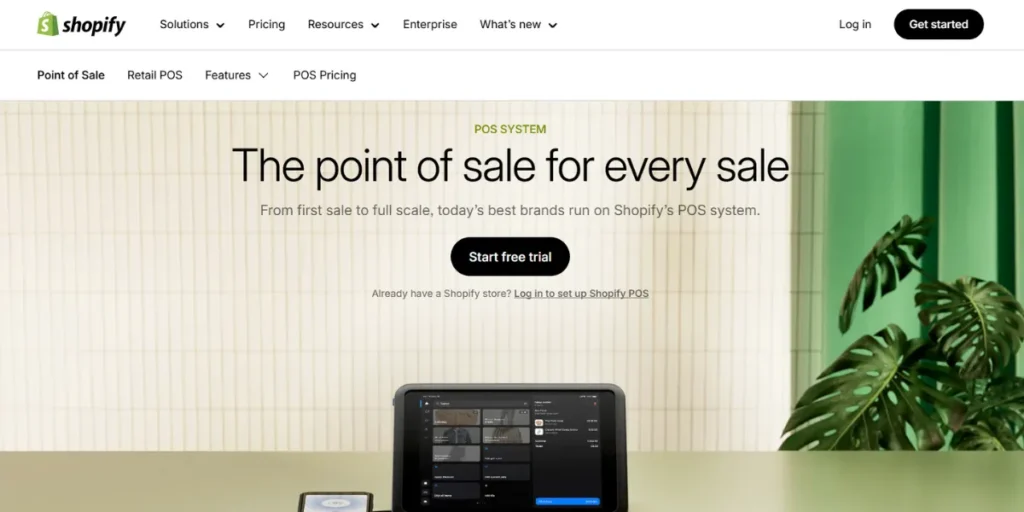
Shopify POS is the best POS system for small business owners who have already established themselves through knowingly the Shopify ecosystem or aim to create a sturdy presence online as well as in the brick-and-mortar establishments. This composite solution removes the sophistication of maintaining separate technologies of conducting store and online sales, as it utilizes unified inventory management, customer base and sales reporting at all channels.
Omnichannel functionality of the platform facilitates advanced retailing approaches such as interactivity, buy-online-pickup-in-store, integrated loyalty and uniform pricing across channels. The comprehensive app ecosystem available at Shopify enables businesses to add niche industry or operation-specific tools to their POS ecosystem. Scale-ability of the system will allow business to expand as a single location start up to a multi location business without any alterations to the platform utilized.
Pros:
- Flawless Shopify e-commerce connection
- wide-ranging third-party app marketplace
- strong omnichannel retailing capabilities
Cons:
- More expensive than simple solutions
- It has a steep learning curve for new users.
- Poor solely brick and mortar prong-based functionality
Pricing: ₹399INR/month
Ideal Business Type: Retail businesses with existing or planned e-commerce operations, fashion boutiques, specialty stores.
Website: https://www.shopify.com/in/pos
3. Toast POS
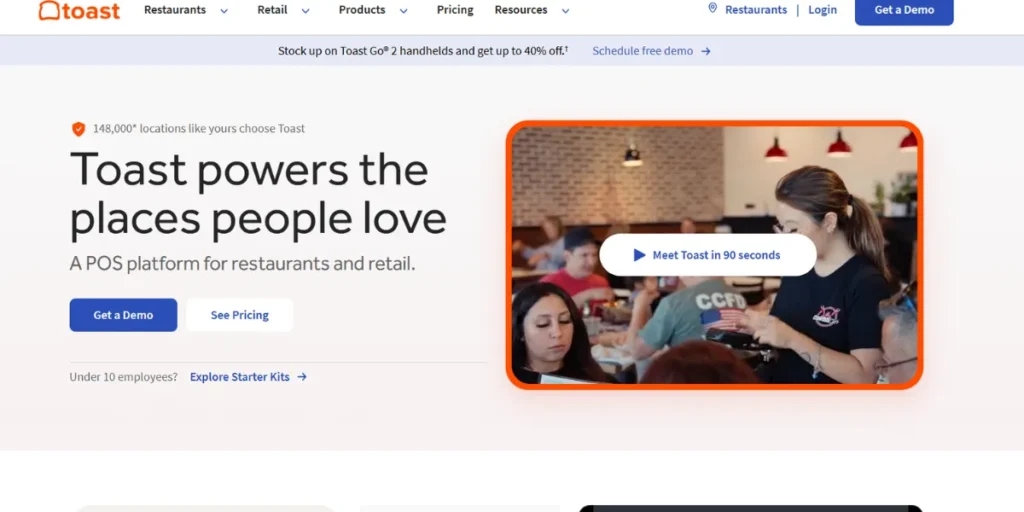
Toast is also designed specifically to overcome the challenges and needs of a food service outlet. It is a restaurant-specific solution that offers specialized tools to manage menus, kitchens and to coordinate staff, as well as optimize customer service. Industry-specific Toast means that each feature is directly useful to the actions of the restaurants and not merely a workaround or compromise.
The platform best suits in complicated restaurant situations with table service, kitchen coordination, split checking and orders with modifiers. Front-of-house operations flow flawlessly with kitchen display systems as the combination minimizes mistakes and accelerates the turnaround time in order fulfillment. The sophisticated reporting further offers a deep analysis of food costs, labor efficiency and menu item performance so that menu optimization and menu cost management strategies can be made on an informed data-driven basis.
Pros:
- Designed specifically to operate restaurants
- Food control systems
- Very good table service includes
Cons:
- Greater Cost of Beyond general systems
- Necessitates only the Toast specific hardware
- The complexity of steep learning curve
Pricing: $69/month
Ideal Business Type: Full-service restaurants, quick-service establishments, bars, cafes, and any food service business requiring specialized restaurant management tools.
Website: https://pos.toasttab.com
4. Lightspeed POS
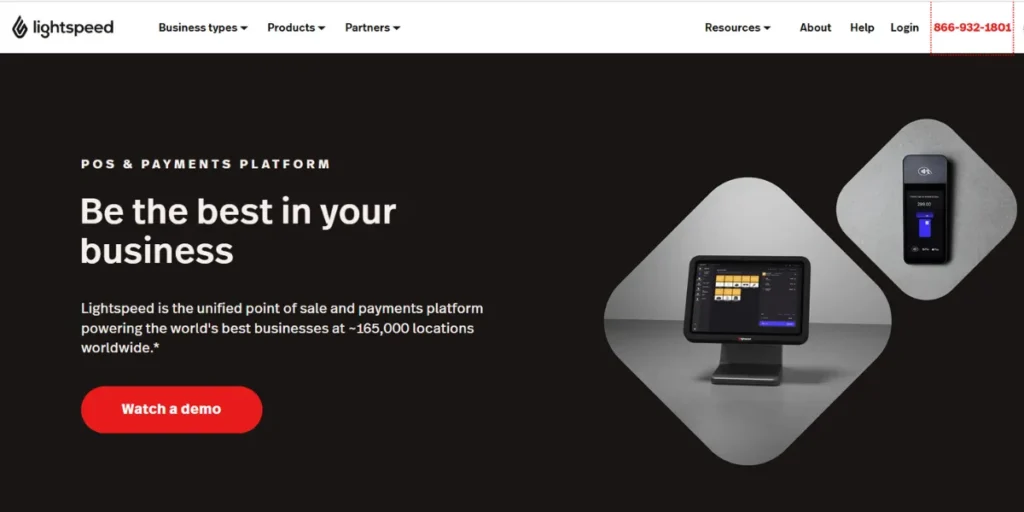
Lightspeed is a best pos system for small business start-up which demands advanced inventory use and multi-store management. This highly effective system offers enterprise-grade functionality at a small business cost enabling it to suit retailers with multiple storefronts, complex product catalogues, seasonal stock flavour or those in need of a centralised system to integrate their stock.
Advanced inventory options and features of the system are a set of reorder points, the suppliers, purchase orders automated and cost tracking. The reporting features in Lightspeed offer comprehensive understanding of sales patterns, customer habits and inventory, that could help in reducing operational expenses and making strategic decisions. This platform is scalable and therefore businesses are able to expand to using multi-stores without having to change systems.
Pros:
- High inventory management functionality
- High-potent multi-location assistance mechanism
- Analytics and reporting in detail
Cons:
- Selling at high prices when compared to basic solutions
- Simple operations are dominated by a complex interface
- Learning/training is steep
Pricing: $89/month
Ideal Business Type: Multi-location retailers, businesses with complex inventory requirements, growing companies planning expansion, and operations requiring detailed analytics and reporting.
Website: https://www.lightspeedhq.com
5. Clover POS
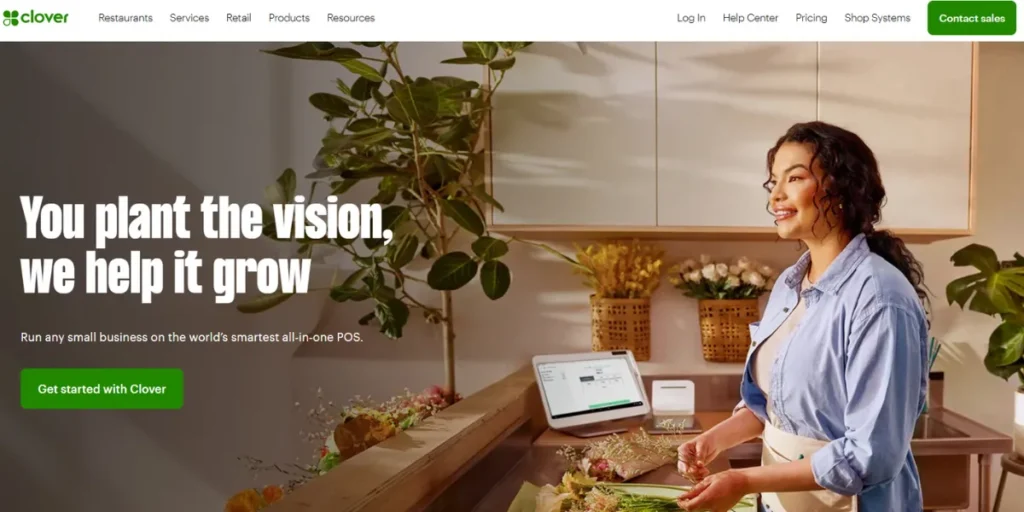
Clover provides an entire ecosystem to include hardware and software support that allows small businesses to grow. With a number of hardware options available, including compact mobile readers and full-featured countertop systems, this all-in-one platform offers flexibility as businesses select hardware packaged to meet their exact operational needs and budget restrictions.
The app marketplace on the platform provides a high degree of customization where a company can add industry-specific or use-specific functionality. The integrated nature of Clover removes the issue of compatibility of parts of various systems and they have unified support and simplified setup operations. The marketing features embedded in the system enable organizations to entice and retain customers by using loyalty schemes, email marketing and management of promotion.
Pros:
- Options to use flexible hardware ensured
- High levels of personalizing the app marketplace
- Customer tools, integrated marketing
Cons:
- Add-ons are on a monthly basis
- Roofier hardware than software-only
- High-end functionality has to be subscribed to
Pricing: Custom pricing
Ideal Business Type: Service businesses, small retailers, restaurants, and any business requiring flexible hardware configurations and extensive customization options.
Website: https://www.clover.com
6. TouchBistro POS
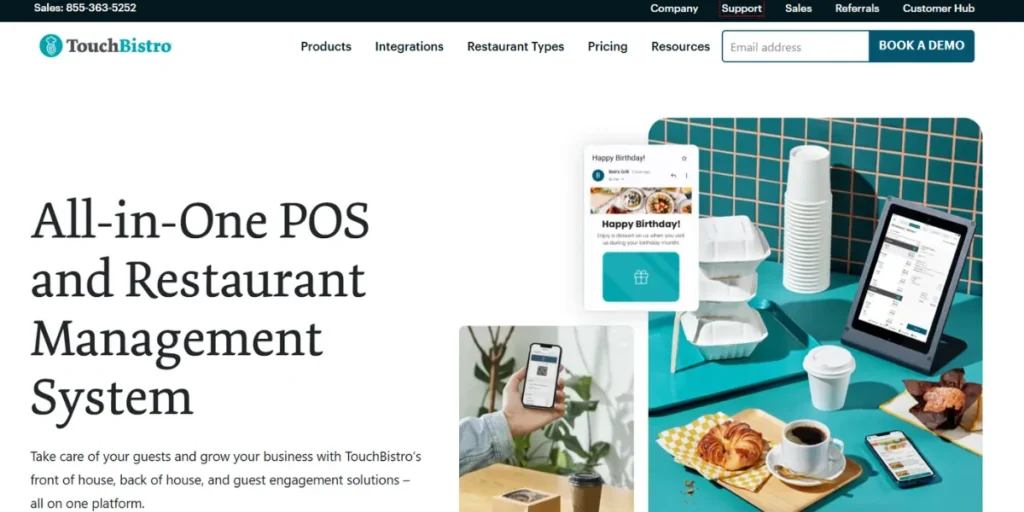
TouchBistro develops iPad-based POS products to meet the needs of the independent restaurant and food service business. This restaurant-specific platform has pared down focus with its functionality and is providing easy to learn interfaces that minimize training time, as well as providing in-depth capabilities of managing orders, processing payment, and basic business intelligence functions.
The offline features implemented by the system guarantee uninterrupted work even in cases when there is no internet access, and cloud synchronization allows providing sales information and reports anywhere. As a pos system for small business, the promotion of independent restaurants to TouchBistro also implies that all its capabilities are directly related to food services without the superfluous complexity and the overhead costs of the enterprise used by large restaurants to a lesser extent.
Pros:
- Easy-to-use design of iPad interface
- Powerful functional offline capacity
- Concentration on feature of restaurants
Cons:
- Few third-party capabilities to integrate with
- Less high-level capabilities to offer
- Ipad addiction needs hardware
Pricing: $69/month
Ideal Business Type: Independent restaurants, small cafes, food trucks, bars, and casual dining establishments prioritizing simplicity and cost-effectiveness.
Website: www.touchbistro.com
7. SumUp POS
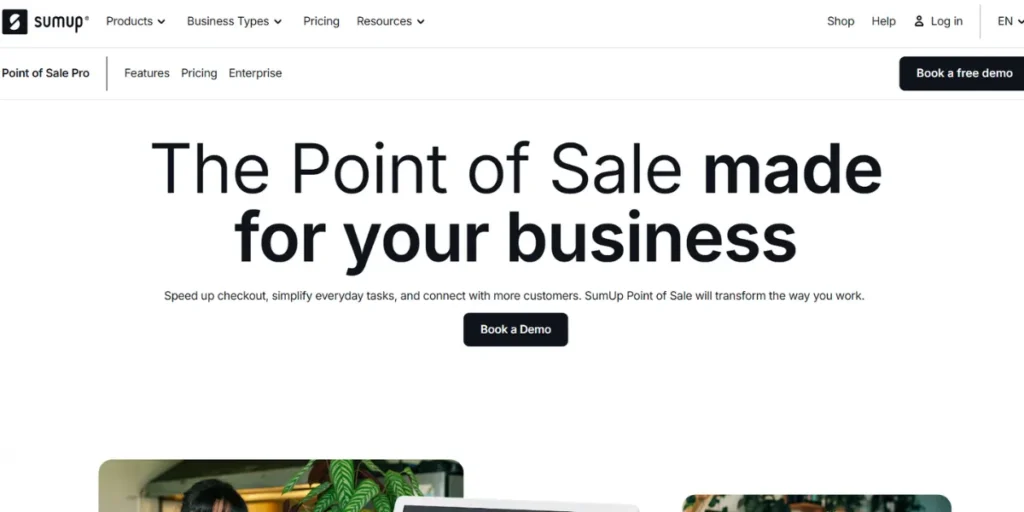
SumUp offers simplified POS that is ideal in small businesses that are not interested in extensive functions yet they are in search of cheaper and easy to use solutions. The platform specializes in core functions such as payment processing, basic inventory management and basic reporting and is therefore an ideal cloud-based solution in businesses that have a simple and streamlined operational need.
The self-ordering kiosk functions in the system enable businesses to cut down labor cost, and increase order accuracy and customer satisfaction. Order aggregation tools available with SumUp put all third-party delivery orders into a single dashboard, easier to manage by businesses that make use of multiple delivery platforms. Cloud-based system architecture adds flexibility of access to the data over the single platform with a reasonable pricing model to fit the budgets of small businesses.
Pros:
- Easy to set up and use
- Reasonable clear pricing model
- Useful aggregation tools of orders
Cons:
- This is the lack of advanced features.
- The possible mobile connectivity problems
- Limited possibilities of customization
Pricing: $99/month
Ideal Business Type: Small cafes, food trucks, pop-up shops, and businesses prioritizing simplicity and low ongoing costs over advanced functionality.
Website: https://www.sumup.com/en-us/pos/sumup-pos/overview
8. OrderCounter POS
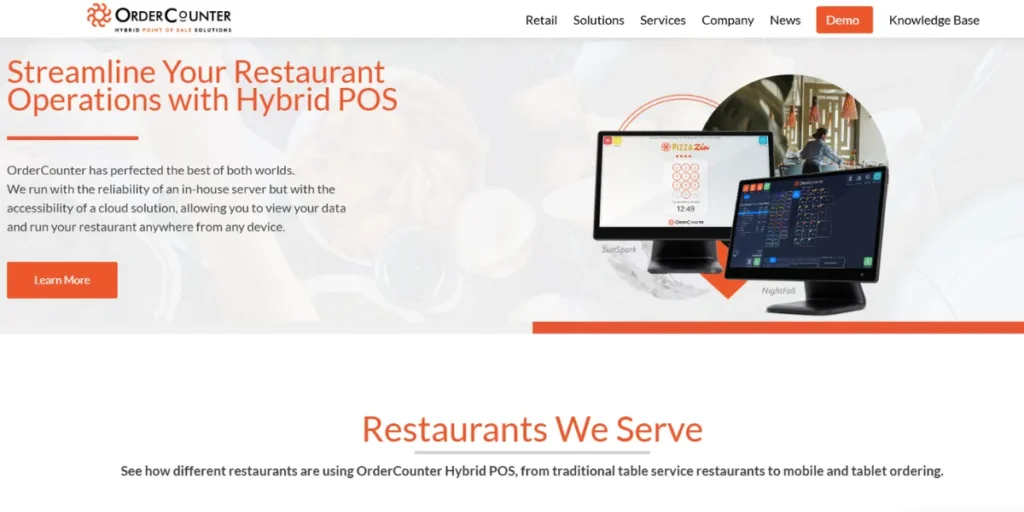
OrderCounter provides hybrid point of sale technology which makes use of local data storage dependability along with the capabilities to improve data accessibility and storage protection over the cloud. This proprietary solution is what allows business continuity and is in turn remotely accessible to sales figures and system controls. The platform is a best pos system for small business where their activities demand robust methods of data protection and reliability of the system.
The dual-storage system used by the system gives assurance to businesses whose operations cannot withstand interruption of their transaction processing or loss of any data. Data replication in real time guarantees the consistency of the information at all applicable components of the system whereas the auto-backup procedures guard against natural failures of hardware or other forms of interference with system operations. Reporting tools in OrderCounter offer in-depth reporting on the way business is performing, ensuring security and accessibility of the data.
Pros:
- The hybrid architecture is reliable
- Strong data backup security
- Works when there is an internet hiccup
Cons:
- Complicated installation as compared to cloud ones
- Increased hardware demands required
- Stated software natural skyglitches (potential)
Pricing: $400 Online Ordering set up fee
Ideal Business Type: Businesses in areas with unreliable internet connectivity, operations requiring high data security
Website: https://home.ordercounter.com
9. KwickPOS
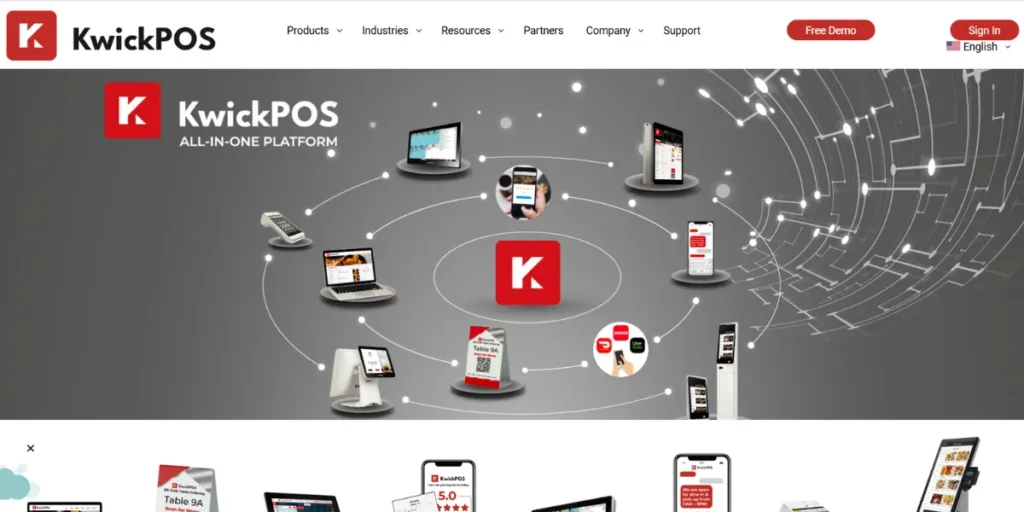
KwickPOS offers a comprehensive business management solution where restaurant operations, online ordering, marketing and back-office activities become one external house. This holistic solution will not require maintenance of multiple software platforms and will ensure that there is cohesive connectedness between the factors that are facing the customer and the operational aspects. To restaurants that look to gaining the best pos system for small business, KwickPOS has systems that scale with operation growth.
The cloud-based platform allows managing and monitoring the platform in real-time, anywhere, and includes marketing tools so that restaurants could attract and retain customers with the relevant campaigns and loyalty programs. KwickPOS is aimed at the simplicity of operational aspects and at the same time it offers analytical tools within the framework of strategic decision-making and performance enhancement.
Pros:
- All in one platform solution
- In-store online ordering applications
- Anywhere-availability through the cloud
Cons:
- The possible slower processing times
- Spread reviews and presence
- Reduced third-party integrations
Pricing: Custom pricing
Ideal Business Type: Small to medium restaurants
Website: www.kwickpos.com
10. Shift 4
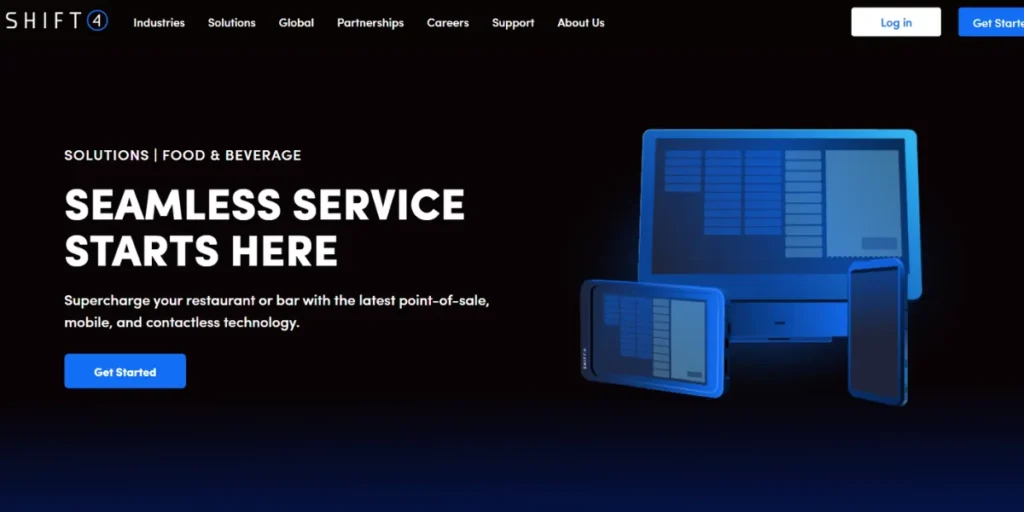
Shift 4 is also the best software in the management of restaurants in various locations which ensures that the restaurants have central command and uniformity of operations. This enterprise level product provides the complexity needed to handle the more complex functionality with down level pricing to accommodate smaller entrepreneurs desiring growth in their business or with multiple income flows. Revel is one of the best pos systems for small business chains and franchises where similar standards of operation are needed.
The centralized nature of the management abilities provided through the platform allows consistency when updating their menus, consistency in pricing and coordination in promotions and reporting across multiple locations. The advanced inventory management enables the complexity of the supply chains, but stays in touch with the live update of the stock level, cost, and supplier performance in the supply chain across geographical locations.
Pros:
- High quality multi-location management features
- Prices and menu control by center.
- Fully featured inventory management system
Cons:
- Greater cost than solutions located at one point
- Complicated installation needs a degree of skill
- Quality of customer service
Pricing: $29.99 per month
Ideal Business Type: Multi-location restaurants and franchise operations.
Website: https://www.shift4.com/food-beverage
How to Choose the Right POS System for Your Business
Evaluation: Evaluate your business processes, transaction volumes, inventory complexity, staff management and integration requirements to see what features are necessities versus nice-to-have functionality that may be worth additional investment.
Budget: Define the monetary setting within reasonable budget limits encompassing the upfront pricing, monthly expenses, transaction prices, gadget expenditure and continual support costs to guarantee long haul financial loyalty in the life of the system.
Scalability: Consider how each platform will support expanding business to new locations, more transaction volumes, more products, broader functions without the need to replace the current system.
Training: Take into account the learning curve of each system, associated training materials, ongoing support capabilities, and amount of time it takes to attain staff proficiency and to run at operational efficiency.
Integration: Evaluate the level to which the tool fits into the current business applications such as accounting software, e-commerce solutions, marketing automations and industry specific applications in order to ensure business operations continuity and data coherence.
POS System Pricing for Small Businesses
Average Cost Breakdown
| Cost Component | Price Range | Description |
| Monthly Software | $0 – $200 | Basic to advanced feature sets |
| Transaction Fees | 1.5% – 3.5% | Per transaction processing cost |
| Hardware | $100 – $2,000 | Tablets, card readers, printers, scanners |
| Setup & Training | $0 – $500 | Implementation and staff training |
| Additional Features | $10 – $100/month | Industry-specific add-ons |
- Software licensing: Monthly subscription models vary in price very widely, starting at a basic free plans to enterprise options at $0 to $200+ per month
- Transaction processing: The cost of processing credit cards generally runs between 1% to 3% of the transaction amount and a flat all-per- transaction charge
- Hardware expenses: With prices increasing according to the requirements of the business up to several systems to around $2,000++
- Setup and training: Free setup is typically offered by some providers whereas others bill between the range of 200-500 dollars on professional installation and staff training
- Dedicated support: Such support is part of most subscriptions but premium support may be at an additional cost
Free vs. Paid Options
| Feature Category | Free Plans | Paid Plans |
| Transaction Processing | Higher fees (2.9%+) | Lower fees (2.6%+) |
| Inventory Management | Basic tracking | Advanced analytics |
| Reporting | Limited reports | Comprehensive analytics |
| Customer Support | Email/chat only | Phone + priority support |
| Integrations | Few options | Extensive marketplace |
| Multi-location | Not available | Full support |
Subscription vs. One-Time Payment Models
| Model Type | Advantages | Disadvantages | Best For |
| Subscription | Lower upfront costs, regular updates, ongoing support | Higher long-term costs, ongoing commitments | Growing businesses, budget-conscious startups |
| One-time Payment | Lower total cost over time, no ongoing fees | Higher upfront investment, limited updates | Established businesses, simple operations |
| Hybrid | Flexible cost structure, customizable features | Complex pricing, potential for cost creep | Businesses with specific needs |
Future Trends in POS Systems
There are still new changes in the POS industry, because of the development of technology, the shift in consumer demands and business conceptions. This knowledge can guide the small business owners to make future considerations in choosing the systems that will continue to be used in their operational lifecycle as relevant and competitive.
- Artificial Intelligence-powered: The integration of artificial intelligence allows predictive analytics, automation of the inventory system system, individualized customer loyalty recommendations, and pricing optimization, turning POS systems into strategic business intelligence tools rather than transaction processing systems.
- Contactless: The rising adoption of contactless methods such as NFC, QR codes, mobile wallets, and biometric authentication is meeting consumer demand for safer, faster, and more convenient shopping experiences, with QR codes in particular making payments easier through quick, scan-and-pay transactions enabled by The QR Code Generator. Even simple additions including tools like QRNow enhance the contactless ecosystem and reduce physical touchpoints inside the store.
- Integration: Incorporation of modern business tools, IoT devices, supply chain and customer experience systems promotes the formation of rich business ecosystems that automatize simple processes and deliver unsurpassed insight into operations.
- Mobility: Highly advanced mobile capabilities provide actual location independence, and can support business multiple venues, events or service locations with consistent operation standards and real time accessibility to data.
- Analytics: Advanced business intelligence applications offer more detailed understanding of customer patterns, business performance, market dynamics, and competitive placements to generate data-driven strategies that can ensure performance and profit maximization.
Conclusion
Choosing the best pos system for small business success has to be a delicate balance between functionality, cost, ease of use, and has the ability to grow with you. The POS systems mentioned in this guide have different models of managing a business, they include basic forms of payment settlement to the full platforms of operation.
Are you looking to find the cheapest solution, a solution with advanced functionality, one that fits your particular industry, or one to scale with? There is a solution to fit your specific needs. The trick is to ensure the business requirements are well-evaluated and an understanding of the implications of pricing, and selection of systems which makes both your short-term needs and longer-term strategy.
Frequently Asked Questions (FAQ)
What features make a POS system the best choice for small businesses?
In the best pos system of the small body of business operations, however, the integration of such core functions as a reliable payment generation system, inventory tracking system, basic reporting and a cheaper cost is merged with the user-friendly interface that does not require a lot of training and makes the operation of the business very relaxed.
How much should small businesses expect to invest in the best pos system for small business?
Small business payments are usually between 1,000-3000 a year, including software subscriptions, transaction processing fees and hardware, however free plans that charge a higher transaction fee can save costs to start a new business.
Can POS systems work without internet connectivity?
High-end POS systems have this support, which supports offline capabilities and allows the carrying of operations smoothly and synchronises data when connecting back to the internet making operations reliable even during internet outages or areas with poor connectivity.
What training is required for staff to use POS systems effectively?
Most modern POS systems take 1-4 hours of training to achieve basic familiarity, and their usable interface and guided workflow often shortens the learning curve in comparison to the systems in which cash registers are used.
How do POS systems integrate with existing business tools?
The most popular POS systems are highly integrated with accounting software, e-commerce solutions, marketing solutions, and industry-specific software by means of APIs, in-built connectors and third-party marketplace solutions.
 Get 50% off on Vault theme. Limited time offer!
Get 50% off on Vault theme. Limited time offer!